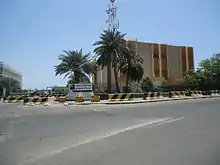Mass media in Djibouti
Mass media in Djibouti is controlled by the government.

Telecommunications
From Djibouti City, telephone connections are available by satellite to Europe and the West and by land line to the main cities and towns of the interior. There were 9,500 mainline telephones and 23,000 cellular phones in use throughout the country in 2003.
Television, radio and Internet

All media are government controlled. Radio Djibouti began broadcasting in the 1940s, during the colonial period in French Somaliland.[1] In 1983, Djibouti inaugurated a powerful state-owned AM radio transmitting station, built with French and FRG funds. A television service was first introduced in 1967. Both are state run and broadcast in Arabic, French, Somali and Afar. As of 2001, there were 1 AM and 2 FM radio stations and 1 television station. In 1997, there were 77 radios and 37 television sets per 1,000 population. Internet access was available to about 6,500 subscribers in 2003.
Print
Djibouti has one primary weekly newspaper, the government owned La Nation de Djibouti,[2] which had a circulation of 4,300 in 2000. Each political party is allowed to publish a public journal. There are several opposition-run weeklies and monthlies that operate freely.
Freedom of speech
The constitution provides for freedom of speech and the press, but the government severely restricts journalism, and international observers say that Djibouti lacks freedom of the press.[3][4]
References
- Dubnov, Helena (2003). A Grammatical Sketch of Somali. Koln: Rudiger Koppe Verlag. p. 10.
- "La Nation de Djibouti".
- "Djibouti". RSF. Retrieved 2017-04-29.
- "Djibouti | Country report | Freedom of the Press | 2015". Freedomhouse.org. Retrieved 2017-04-29.
Bibliography
- "Djibouti: Directory: Broadcasting and Communications". Africa South of the Sahara 2003. Regional Surveys of the World. Europa Publications. 2003. p. 347. ISSN 0065-3896.
External links
- Karen Fung, African Studies Association (ed.). "News (by country): Djibouti". Africa South of the Sahara. USA – via Stanford University.
Annotated directory
![]() This article incorporates public domain material from the Library of Congress Country Studies website http://lcweb2.loc.gov/frd/cs/.
This article incorporates public domain material from the Library of Congress Country Studies website http://lcweb2.loc.gov/frd/cs/.
